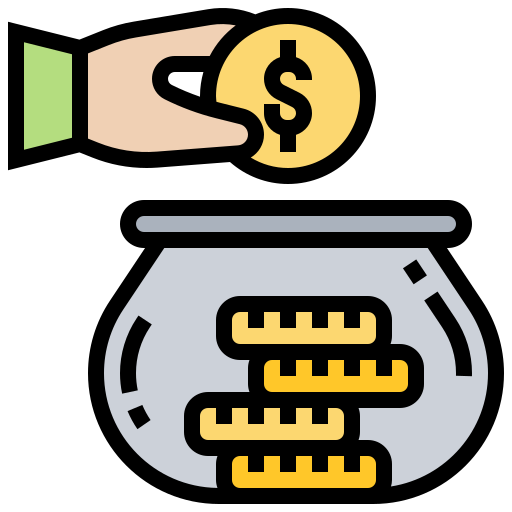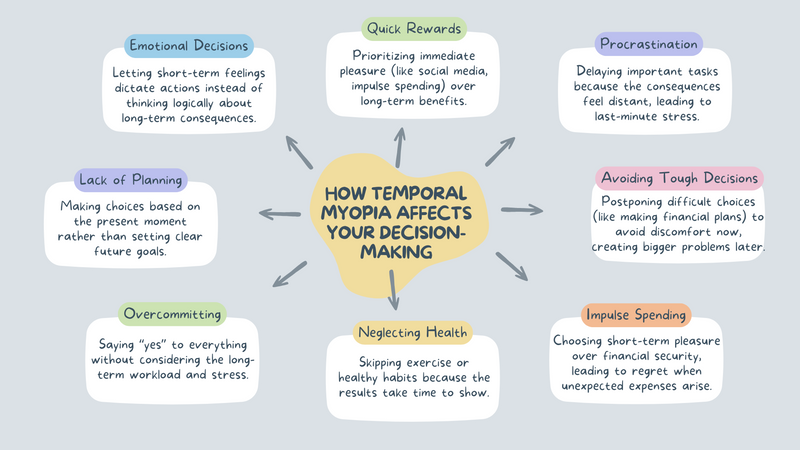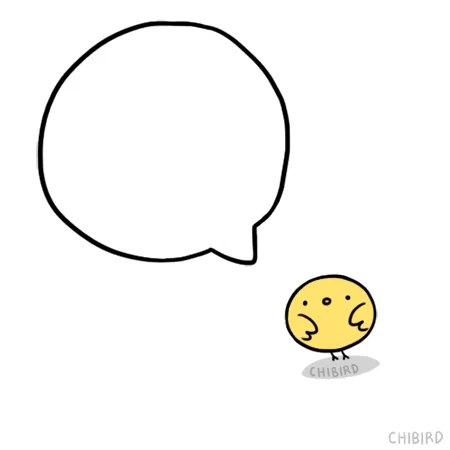You’ve been working hard to stick to your diet all week, but there it is — a delicious tart with cream sitting right in front of you. Your brain tells you it's not worth the cheat, yet the thought of how good it will taste is hard to resist.

You convince yourself, “Just one bite won’t make a difference. I’ll get back on track tomorrow.” You give in, and in that moment, it feels good. But later, you realize that one bite turned into a whole tart, and now you’re a few steps back on your health goals. Sound familiar?
This short-sighted decision-making is called temporal myopia. It causes you to focus on short-term rewards over long-term benefits, leading to decisions that feel fantastic now but result in regret later.
Why Does Temporal Myopia Happen?
We’re drawn to quick rewards — it’s just how we’re built. In the past, focusing on immediate needs like food and safety helped humans survive. But today, that same instinct makes it harder to stick to long-term goals.

Temporal myopia makes future rewards seem distant while instant pleasure feels urgent and hard to resist. We’ve all been there — making choices that feel good in the moment but lead to regret later. It’s not that we don’t care about our future selves, the immediate reward is just more tempting.
The good news? As soon as you realize you have this habit, you can start making small changes to break the cycle of temporal myopia and set yourself up for success.
Is Temporal Myopia Taking Over Your Life?

At Work
You've got a large project you need to finish in a few days, and you know you need to focus. You receive a notification on your phone. “Just a quick check,” you tell yourself. Before you know it, 45 minutes is gone, browsing through social media. Now, you’re behind at work and regretting the lost time.

Financially
You keep telling yourself you’ll start saving next month. But you see a new device or a discount that you can't resist. Spending feels great in the moment, and saving? That’s a problem for future you. But then, out of nowhere, an emergency hits, and you regret not saving sooner.

Health & Habits
You decide to get in shape, so you plan to exercise regularly. But when it’s time to exercise, relaxing on the couch sounds more enjoyable. “I’ll start tomorrow,” you tell yourself. The problem? Tomorrow keeps getting pushed further away. The longer you delay, the harder it becomes to build the habit, and your goal remains out of reach.
How Temporal Myopia Affects Your Decision-Making
 The diagram is created by the author. To hear an audio description of the diagram, click play on the audio player below:
The diagram is created by the author. To hear an audio description of the diagram, click play on the audio player below:
How to Shift Your Mindset

To move away from temporal myopia:
Pause before you act. Ask yourself, “Will this choice help me reach my long-term goals?” Pausing for even one minute to decide might help you make good choices.
Make the future feel real. Imagine yourself six months from now. Will you be grateful you stayed disciplined, or regretful you gave in to short-term comfort?
Use small, immediate rewards. Give yourself something to look forward to after completing a task. It keeps you motivated and makes big goals feel more doable.
Build barriers to impulsive decisions. Turn off notifications and set time limits on social media. The harder it is to make a bad choice, the less likely you are to do it.
Make the right choice the easy one. Set up your environment so the right choices are easier. Schedule deep work sessions, prep healthy meals ahead of time, or set up automatic savings.
Decision-Making Tool: "Future Me Check-In"
Whenever you face a tough decision — whether it's procrastinating, spending money, or skipping a workout—pause and play this quick mental game before temporal myopia sets in:
Imagine "Future You" a week or a month from now.
Give them a voice — what would they tell you about the choice you're about to make? Would Future You thank you or regret it?
If Future You wouldn’t like the outcome, rethink your decision. If they’d be proud, go for it!

Quiz: Avoiding Temporal Myopia
You’re about to skip studying for an important exam to binge-watch your favorite show. What’s the best way to think this through before making a choice?
A. Assume everything will be fine and watch the show anyway.
B. Think about how Future You would feel — grateful for studying or regretful for skipping?
C. Ask a friend what they would do instead of considering Future You.
D. Promise to study later but never set a specific time to do it.
Quiz
What’s the smartest approach for deciding?
Take Action

Small, consistent decisions add up! The more you get into the habit of thinking beyond the current moment, the more control you’ll have over your life.
To avoid temporal myopia:
Your feedback matters to us.
This Byte helped me better understand the topic.
